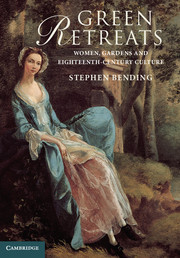5 - ‘Can you not forgive?’
Henrietta Knight at Barrells Hall
from Part II
Published online by Cambridge University Press: 05 August 2013
Summary
In 1736 Henrietta Knight (1699–1756) was banned from London, from living within twenty miles of the Bath Road, and from corresponding with her closest friends. Sent to a rundown country estate in the Midlands, she spent the rest of her life cultivating a small circle of friends, and a garden. Born Henrietta St John (Figure 5.1), she married Robert Knight junior in 1727 and, on his elevation to the Irish peerage in 1745, she took the title of Lady Luxborough. Her father was the cantankerous Henry St. John of Lydiard Tregoze and Battersea, and while her brothers John and Holles would go on to make almost no impact in the world, her eldest brother, or rather half-brother, was the arch politician, arch-rival of Robert Walpole, figure of near adoration for Alexander Pope, and figurehead of Tory opposition politics in the early eighteenth century, Henry St. John, Viscount Bolingbroke. When the crisis of Henrietta's life arrived, it was Bolingbroke (1678–1751) who proved himself Henrietta's closest family ally, and it was Bolingbroke who continued to influence her life as she entered a world of enforced retirement at the neglected Knight estate of Barrells Hall in Warwickshire. Like her half-brother, Henrietta Knight would find herself ousted from a very public life and forced to live in the country; like her half-brother, too, she would take to gardening in the absence of that public world; unlike her half-brother, gardening would not be for her a means of self-justification and rehabilitation around which powerful public allies would gather in support.
Knight's letters were published soon after her death, and almost as soon dismissed by Horace Walpole for their obsession with the everyday. That ‘obsession’, however, offers us richly detailed access to the life of a woman whose biography charts the now familiar trajectory from fashionable public life to country shame; a trajectory which turns on women's education, imaginative freedom, and the dangers of romance; a trajectory, too, which signals the shifting significance and the limits of the literary, as well as the damaging collisions between literary exercises and gender conventions, between romantic fantasies and rural realities.
- Type
- Chapter
- Information
- Green RetreatsWomen, Gardens and Eighteenth-Century Culture, pp. 204 - 241Publisher: Cambridge University PressPrint publication year: 2013



